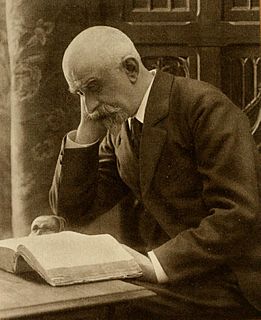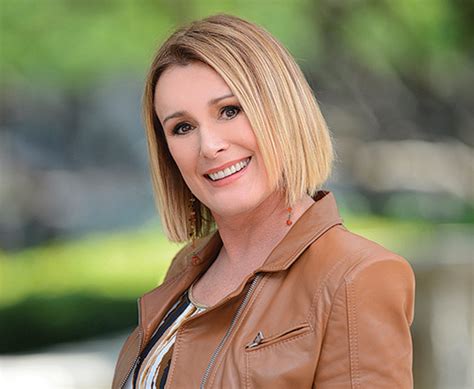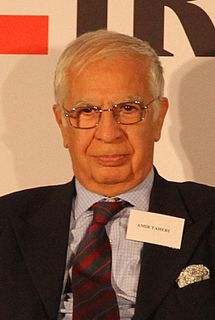Top 455 Spectacle Quotes & Sayings - Page 8
Explore popular Spectacle quotes.
Last updated on April 15, 2025.
Images detached from every aspect of life merge into a common stream, and the former unity of life is lost forever. Apprehended in a partial way, reality unfolds in a new generality as a pseudo-world apart, solely as an object of contemplation. The tendency toward the specialization of images-of-the-world finds its highest expression in the world of the autonomous image, where deceit deceives itself. The spectacle in its generality is a concrete inversion of life, and, as such the autonomous movement of non-life.
I was grateful to see President Obama's victory speech. I was over the moon to see the audience. There were about 60 percent white voters the other 40 percent were African Americans, Asian, Spanish speaking etc. I wept at that spectacle, it told me that the pundits that continue in our country to try to polarize us, to keep us apart, are not succeeding. Americans are waking up not only to the truth, but the truth in each other. Hallelujah!
Again, in our enterprises we present the singular spectacle of daring and deliberation, each carried to its highest point, and both united in the same persons; although usually decision is the fruit of ignorance, hesitation of reflection. But the palm of courage will surely be adjudged most justly to those, who best know the difference between hardship and pleasure and yet are never tempted to shrink from danger. In generosity we are equally singular, acquiring our friends by conferring, not by receiving, favours.
Her seductive power, however, did not lie in her looks [...]. In reality, Cleopatra was physically unexceptional and had no political power, yet both Caesar and Antony, brave and clever men, saw none of this. What they saw was a woman who constantly transformed herself before their eyes, a one-woman spectacle.Her dress and makeup changed from day to day, but always gave her a heightened, goddesslike appearance. Her words could be banal enough, but were spoken so sweetly that listeners would find themselves remembering not what she said but how she said it.
To those who feel that their values are THE values, the less controlled systems necessarily present a spectacle of "chaos," simply because such systems respond to a diversity of values. The more successfully such systems respond to diversity, the more "chaos" there will be, by definition, according to the standards of ANY specific set of values- other than diversity or freedom as values. Looked at another way, the more self-righteous observers there are, the more chaos (and "waste") will be seen.
It is, indeed, a fact that, in the midst of society and sociability every evil inclination has to place itself under such great restraint, don so many masks, lay itself so often on the procrustean bed of virtue, that one could well speak of a martyrdom of the evil man. In solitude all this falls away. He who is evil is at his most evil in solitude: which is where he is at his best - and thus to the eye of him who sees everywhere only a spectacle also at his most beautiful.
Emily suffers no more from pain or weakness now. She will never suffer more in this world. She is gone after a hard, short conflict...Yes there is no Emily in time or on earth now. Yesterday we put her poor, wasted, mortal frame quietly under the chancel pavement. We are very calm at present. Why shoud we be otherwise? The anguish of seeing her suffer is over; the spectacle of the pains of death is gone by; the funeral day is past. We feel she is at peace. No need now to trouble for the hard frost and the keen wind. Emily does not feel them.
The liberal appropriations made by the legislature of Kentucky for a general system of education cannot be too much applauded . . . . Learned institutions ought to be the favorite objects with every free people. They throw that light over the public mind which is the best security against crafty and dangerous encroachments on the public liberty . . . . What spectacle can be more edifying or more seasonable than that of liberty and learning, each leaning on the other for their mutual and surest support?
Remember what Hannah Arendt said when she was talking about fascism and totalitarianism. She said thoughtlessness is the essence of totalitarianism. So all of a sudden emotion becomes more important than reason. Ignorance becomes more important than justice. Injustice is looked over as simply something that happens on television. The spectacle of violence takes over everything.
There is not a more disgusting spectacle under the sun than our subserviency to British criticism. It is disgusting, first, because it is truckling, servile, pusillanimous--secondly, because of its gross irrationality. We know the British to bear us little but ill will--we know that, in no case do they utter unbiased opinions of American books . . . we know all this, and yet, day after day, submit our necks to the degrading yoke of the crudest opinion that emanates from the fatherland.
No longer was she merely the dancing-girl who extorts a cry of lust and concupiscence from an old man by the lascivious contortions of her body; who breaks the will, masters the mind of a King by the spectacle of her quivering bosoms, heaving belly and tossing thighs; she was now revealed in a sense as the symbolic incarnation of world-old Vice, the goddess of immortal Hysteria, the Curse of Beauty supreme above all other beauties by the cataleptic spasm that stirs her flesh and steels her muscles, - a monstrous Beast of the Apocalypse, indifferent, irresponsible, insensible, poisoning.
I was driving down a familiar road one fall day when I almost drove off the road, the beauty was so intense. It looked as if God had sent in a team of the world's finest artists overnight-and I was privy to the opening day of his spectacle. As I slowly drove along this festive row, leaves danced in the air and brushed against my windshield. It seemed as if I had landed in Oz. I was strongly tempted to get out and clap at God's imagination.
I love theater, a performance and designing a visual spectacle. It is like creating a composition with clothes, which have to fit the psychology as well as the body of characters. The performance is frozen in time, the clothes have to stay reliable and help to define the story. Fashion can be much more abstract. It needs no story because the woman is the story. She supplies the text and content. Fashion for retail is the opposite of frozen, it has to change and morph constantly to stay relevant - to be the "fashion.".
There is still boxing, but there's just no money in it anymore. If you went around the world and asked a bunch of people under 20 years old, to name a boxer, I bet they couldn't name one. They'd be able to name a UFC fighter though. When I was younger there was Mike Tyson and we watched everything. I'm not saying its gone, or its going to go, and it could easily be ignited by another fighter, but it's just that idea that UFC is more violent, that desire for more spectacle, has captured people's attention.
In societies where modern conditions of productions prevail, all of life presents itself as an immense accumulation of spectacles. Everything that was directly lived has moved away into representation. The images detached from every aspect of life fuse in a common stream in which the unity of this life can no longer be re-established. Reality considered partially unfolds, in its own general unity as a pseudo-world apart, an object of mere contemplation . . . The spectacle is not a collection of images, but a social relation among people, mediated by images.
We're going to have another rude awakening, a war or depression where people are going to have to value one another again and not value money and winning alone. On the political environment we now have a President who likes winning and money and he represents aspects of the spectacle we were alluding to, and yet he's my President and I am for anyone who is my President. I'm an American and yet it's the style thing. We’ll see what happens. He’d like to see things work well and trying to get us to that place as a country.
I can only gaze with wonder and awe at the depths of and heights of our psychic nature. Its non-spatial universe conceals an untold abundance of images which have accumulated over millions of years of living development and become fixed in the organism....Beside this picture I would like to place the spectacle of the starry heavens at night, for the only equivalent of the universe within is the universe without; and just as I reach this world through the medium of the body, so I reach that world through the medium of the psyche.
Note, to-day, an instructive, curious spectacle and conflict. Science, (twin, in its fields, of Democracy in its)—Science, testing absolutely all thoughts, all works, has already burst well upon the world—a sun, mounting, most illuminating, most glorious—surely never again to set. But against it, deeply entrench'd, holding possession, yet remains, (not only through the churches and schools, but by imaginative literature, and unregenerate poetry,) the fossil theology of the mythic-materialistic, superstitious, untaught and credulous, fable-loving, primitive ages of humanity.
We live in succession, in division, in parts, in particles. Meantime within man is the soul of the whole; the wise silence; the universal beauty, to which every part and particle is equally related, the eternal ONE. And this deep power in which we exist and whose beatitude is all accessible to us, is not only self-sufficing and perfect in every hour, but the act of seeing and the thing seen, the seer and the spectacle, the subject and the object, are one. We see the world piece by piece, as the sun, the moon, the animal, the tree; but the whole, of which these are shining parts, is the soul.
Horror grows impatient, rhetorically, with the Stoic fatalism of Ecclesiastes. That we are all going to die, that death mocks and cancels every one of our acts and attainments and every moment of our life histories, this knowledge is to storytelling what rust is to oxidation; the writer of horror holds with those who favor fire. The horror writer is not content to report on death as the universal system of human weather; he or she chases tornadoes. Horror is Stoicism with a taste for spectacle.
Capitalism with near-full employment was an impressive spectacle. But a growth in wealth is not at all the same thing as reducing poverty. A universal paean was raised in praise of growth. Growth was going to solve all problems. No need to bother about poverty. Growth will lift up the bottom and poverty will disappear without any need to pay attention to it. The economists, who should have known better, fell in with the same cry.
For we have a choice in this country. We can accept a politics that breeds division, and conflict, and cynicism. We can tackle race only as spectacle - as we did in the OJ trial - or in the wake of tragedy, as we did in the aftermath of Katrina - or as fodder for the nightly news. We can play Reverend Wright's sermons on every channel, every day and talk about them from now until the election, and make the only question in this campaign whether or not the American people think that I somehow believe or sympathize with his most offensive words.
There is no doubt, that man is not built to be a carnivorous animal. What a sweet, pleasing and innocent sight is the spectacle of a table served that way and what a difference to a make up of fuming animal meat, slaughtered and dead! Man in no way has the constitution of a carnivorous being. Hunt and voracity are unnatural to him. Man has neither the sharp pointed teeth or claws to slaughter his prey. On the contrary his hands are made to pick fruits, berries and vegetables and teeth appropriate to chew them.
Now, as when I made films that were too autobiographical, the problem is how to escape naturalism. If you tell a strictly true story, because the way you are telling it is false, it creates naturalism. But I become a naturalist. And to become a naturalist is something I avoid. It is fake life - that is the problem. It is because we are familiar with situationnisme, and the critique of the spectacle, et cetera, which is a very fair criticism. People who have no life, and who watch this fake life on a screen - it's a very alienated situation. And that's what situationnisme is about.
Islamic ethics is based on 'limits and proportions,' which means that the answer to an offensive cartoon is a cartoon, not the burning of embassies or the kidnapping of people designated as the enemy. Islam rejects guilt by association. Just as Muslims should not blame all Westerners for the poor taste of a cartoonist who wanted to be offensive, those horrified by the spectacle of rent-a-mob sackings of embassies in the name of Islam should not blame all Muslims for what is an outburst of fascist energy.
There was a very important superintendent of Yellowstone, a man who was involved in the founding of the National Park Service itself, Horace Albright. And he became superintendent, which is the boss of Yellowstone Park, in 1919 - from 1919 to 1929. Later, he was director of the park service itself. Albright embraced the idea that in order for the national parks - and Yellowstone in particular - to have support from the American people and from politicians, there needed to be wildlife as spectacle.
I was lucky enough to see with my own eyes the recent stock-market crash, where they lost several million dollars, a rabble of dead money that went sliding off into the sea. Never as then, amid suicides, hysteria, and groups of fainting people, have I felt the sensation of real death, death without hope, death that is nothing but rottenness, for the spectacle was terrifying but devoid of greatness... I felt something like a divine urge to bombard that whole canyon of shadow, where ambulances collected suicides whose hands were full of rings.
Governments are deemed to succeed or fail by how well they make money go round, regardless of whether it serves any useful purpose. They regard it as a sacred duty to encourage the country’s most revolting spectacle: the annual feeding frenzy in which shoppers queue all night, then stampede into the shops, elbow, trample and sometimes fight to be the first to carry off some designer junk which will go into landfill before the sales next year. The madder the orgy, the greater the triumph of economic management.
So the Midwest nourishes us [...] and presents us with the spectacle of a land and a people completed and certain. And so we run to our bedrooms and read in a fever, and love the big hardwood trees outside the windows, and the terrible Midwest summers, and the terrible Midwest winters [...]. And so we leave it sorrowfully, having grown strong and restless by opposing with all our will and mind and muscle its simple, loving, single will for us: that we stay, that we stay and find a place among its familiar possibilities. Mother knew we would go; she encouraged us.
Is there a more pitiable spectacle than that of a wife contending with others for that charm in her husband's sight which no philters and no prayers can renew when once it has fled forever?
Women are so unwise. Love is like a bird's song beautiful and eloquent when heard in forest freedom, harsh and worthless in repetition when sung from behind prison bars.
You cannot secure love by vigilance, by environment, by captivity. What use is it to keep the person of a man beside you if his soul be truant from you?
The study of the properties of numbers, Plato tells us, habituates the mind to the contemplation of pure truth, and raises us above the material universe. He would have his disciples apply themselves to this study, not that they may be able to buy or sell, not that they may qualify themselves to be shopkeepers or travelling merchants, but that they may learn to withdraw their minds from the ever-shifting spectacle of this visible and tangible world, and to fix them on the immutable essences of things.
I said, I know why you’re afraid to fight with me.” "And why is that?” If he flexed again, I’d have to implement emergency measures. Maybe I could kick some sand at him or something. Hard to look hot brushing sand out of your eyes. "You want me.” Oh boy. "You can’t resist my subtle charm, so you’re afraid you’re going to make a spectacle out of yourself.” "You know what? Don’t talk to me.
Gandhi has sound economic and cultural reasons for encouraging the revival of cottage industries, but he does not counsel a fanatical repudiation of all modern progress. Machinery, trains, automobiles, the telegraph have played important parts in his own colossal life! Fifty years of public service, in prison and out, wrestling daily with practical details and harsh realities in the political world, have only increased his balance, open-mindedness, sanity, and humorous appreciation of the quaint human spectacle.
Sci-fi uses the images that sf - starting with H.G. Wells - made familiar: space travel, aliens, galactic wars and federations, time machines, et cetera, taking them literally, not caring if they are possible or even plausible. It has no interest in or relation to real science or technology. It's fantasy in space suits. Spectacle. Wizards with lasers. Kids with ray guns. I've written both, but I have to say I respect science fiction enough that I wince when people call it sci-fi.
Since God is the end of man, since he has created us to be perfect and happy in him, it is manifest that if the designs of creation have not here below been entirely frustrated, there should be found men who tend to their end in seeking and loving God. And nevertheless, because of human liberty, there should also be found other men who neglect God, their principle and their end, and yield to the seduction of created things. Such indeed is the spectacle which the history of the world unceasingly presents to us.

































